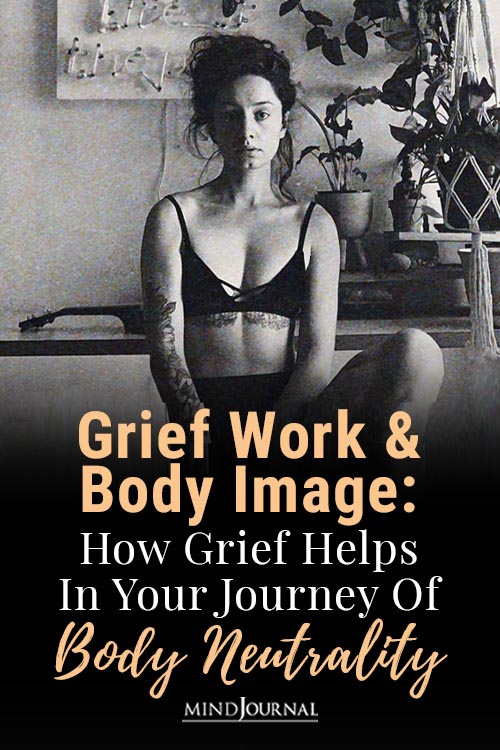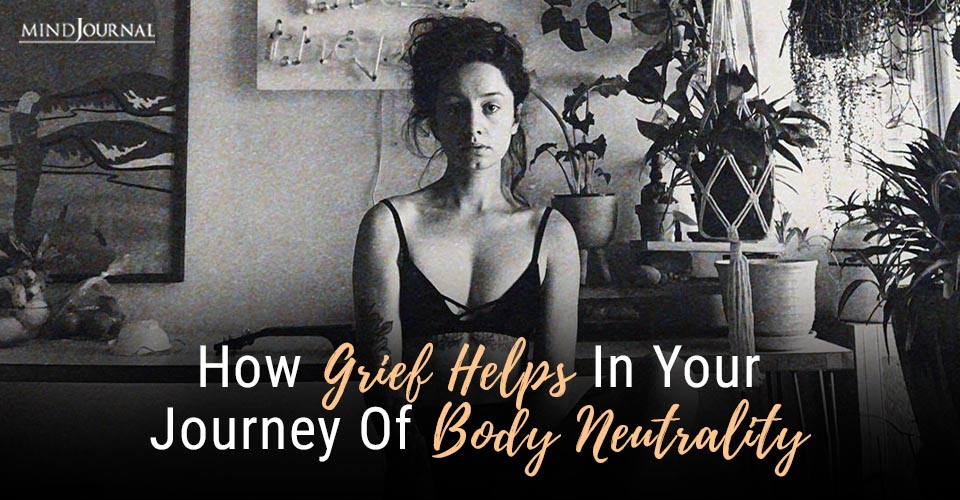Did you give up on your fantasy body image? Then it’s time to get started with grief work and body image!
Today I want to talk about the hugely important role of grief on the body neutrality journey.
Grief is central to the body image healing work most of my clients do, and one of the most important tools I believe exists when it comes to body acceptance.
So let’s talk for a moment about what grief is, and what it isn’t.
Grief is not depression, wallowing, moping, complaining, or self-pity. It can accompany those things, but in its purest form grief is just a deep sorrow or sadness over the loss of something precious.
When it’s allowed to move through a person freely, grief is also a bridge from before to after that loss. Grief is the boat taking you from the old shore in which that thing existed, and the new shore, in which that thing is gone.
Grief is a shuttle, moving you from the past to the present.
Perhaps you know someone who seems stuck in the past. I always think of the stereotypical popular high school jock who felt that he was destined for athletic greatness… but then went on to live an average life in an average town. This man tends to retell stories from “back in the glory days” to anyone who will listen, tries to “get the old gang back together,” and is clearly a bit disappointed or embarrassed with how life turned out.
Listening to this person might make you sad. It’s clear this person hasn’t taken the grief shuttle out of the past and into the present. They haven’t let their heartbreak for what they’ve lost, and as such, they’re either still back there, or still haunted by an alternative version of how life was “supposed to be.”
When we resist grief, we find ourselves constantly ruminating, feeling stuck, feeling frustrated or unhappy, always comparing and criticizing, a feeling of dissatisfaction or victimhood, always wishing for a different or better reality.
On the flip side, what happens when we allow ourselves to grieve?
When we properly grieve our losses, we are able to fully let them go and move on. Grieving means we let our hearts break; we feel everything and don’t try to “cheer up” or “think positive.” We acknowledge the significance of what we have lost, and let the whole thing roll through us, breaking us open physically and emotionally.
On the other side of grief there tends to be joy, peace, and acceptance. Instead of “I wish things were different,” grief helps us experience reality clearly so that we can say “this is how things are.”
For those of us who are highly sensitive feelers, learning to grieve tends to be even more important.
I had a client recently tell me that she never thought about her childhood because it was too sad. I asked what was sad about it, since she had otherwise described a fairly happy childhood. “It’s just so unbearably sad that it’s gone,” she responded.
If you are especially sensitive, the passing of time itself may break your heart; the fragile and temporary nature of human life itself might require grief. That’s ok. You were born to feel all the things deeply. Me too. I see you, and grief will likely plan an even more important in your body image healing journey.
So what is there to grieve when it comes to body image?
The biggest loss most people experience as they move out of diet culture, beauty culture, body obsession and control, body anxiety, and negative body image, is the loss of their “dream body,” and what that dream body represented.
Your dream body is the body you tell yourself you would have if only you were better, stronger, more disciplined, harder working or had the time/money. For some folks this is about a number on the scale, certain proportions or measurements, or a specific clothing size. For others, it’s about fixing every perceived flaw from cellulite to acne to body hair to stubby eyelashes.
Related: How To Overcome Social Anxiety: 10 Steps To Beat It For Good
Whatever your personal “dream body” might look like, giving up that fantasy is devastating and requires grief.
But it’s not just the body itself you’re giving up. It’s also everything that body represents.
Because in your fantasy, you don’t look perfect but still feel the same way and live the same life, right??
No. In the fantasy, you look different and you feel confident, energetic, peaceful, happy, sexy, fulfilled, popular, and/or vibrant. In the fantasy, looking different is like having the keys to the proverbial kingdom! Looking that way means life will be easier, intimacy and love will be easy and abundant, you’ll be accepted and respected by everyone, suffering will cease, and rejection and abandonment will be practically impossible.
This is what you’re actually grieving: the loss of a world in which looking “better” has the power to fix all your problems and give you the life you want. The loss of a world in which your appearance could keep you safe from rejection, abandonment, or pain; in which your body could give you freedom, confidence, belonging, and a feeling of finally being “good enough.”
When you start digging into body neutrality work you’ll quickly realize that your body can’t get your emotional needs met; that your appearance isn’t actually that powerful, and that no amount of controlling it will change the reality we live in.
But we must acknowledge that the loss of a fantasy in which safety, love, belonging, respect, and acceptance were within your reach and control if you just tried hard enough is the loss of something precious, and it needs to be grieved in order to let it go and move on.
There are other losses too. The loss of feeling superior to other people who didn’t “work as hard” and “look as good” is a one for many people in small bodies. The loss of a reality in which you can avoid fatphobic oppression and erasure is a huge one for many people in large bodies.
I once had a client tell me she couldn’t stop ruminating and obsessing over what she ate, and we discovered grief work to be done there. She had a habit of imagining who she would be if she had “been better” and resisted eating, after every meal. Like the guy re-hashing his glory days, she re-hashed her imaginary glory days; she tortured herself with an image of herself thinner, happier, freer, more popular, and more confident.
Related: This Optical Illusion Test Reveals Your Secret Strengths And Weaknesses
For a while, after every meal she had to acknowledge the painful loss of this appetite-free person, this impossible fantasy of herself. She told me she would repeat “that person doesn’t exist,” and that it felt like her best friend had died, after every meal, for weeks.
If you’re struggling with body image, you may need to acknowledge the loss of your fantasy body, or fantasy self. That better, more disciplined, less hungry, thinner, more perfect different version of you doesn’t exist… or maybe can’t exist without costing too much.
You must let that imagined version of yourself die, in order to live fully as the person you are.
You must mourn the loss of your perfect life in order to find peace and joy in this one.
Grieve for the loss of her, and for everything her existence ever promised or represented.
- Grieve for the fantasy of being a “tiny, perfect bride” on your wedding day, or the fantasy that by looking thin and pretty enough you won’t have to work as hard to get your connection and intimacy needs met.
- Grieve for the fantasy in which your body was the key to feeling confident, happy, peaceful, present, and worthy.
- Grieve for the fantasy in which looking “good enough” meant your partner would never cheat or leave you, suffering would disappear, sex would be amazing, and your mother would finally be proud of you.
Let your heart break. The world you’ve been inventing sounds beautiful, but it’s not real. That’s worth letting your heart break over.
I wish your body really had that much power, for your sake. I wish finding the right exercise routine really would make you safe and happy and in control; I wish the way to fight fatphobic oppression was to get thin enough; I wish all your problems really did come from the way you look.
That would be a lot easier. But that’s now how it works. Instead, all we have if the grief-shuttle from there to here. Let your heart break until you get to the other shore, and acceptance becomes possible.
If you’re new to grief work and body image, here’s where you can start.
1. Recognize and identify
Recognize and identify any areas in which you’ve been harbouring fantasies or magical thinking when it comes to your body or appearance.
What lies have you been telling yourself? What alternative realities have you been living in? Name who or what needs to die for you to let go of that fantasy and move on. That’s the first step in grief work and body image!
Related: 12 Tips To Self-Love And Compassion
2. Grieve the loss
Grieve the loss of that fantasy, reality, idea, person, place, or thing the same way you would a beloved person
Let your heart break and feel it all. Note that this step can require a lot of time, energy, and support.
Related video:
3. Find joy and acceptance on the other side.
Without that fantasy version of yourself haunting you, you are now free to look in the mirror and be good enough as you are. Without that alternative reality haunting you, you are now free to notice, accept, embrace, enjoy, and engage in this one.
Related: The Five Stages Of Grief: Exploring The Kübler-Ross Model
4. Repeat as needed forever.
Life is sad and messy and for those of us who are highly sensitive, we may need to be constantly dipping in and out of grief work. When the pandemic hit I grieved for weeks the loss of my plans with my boyfriend, my idea of how life should be, my life in Los Angeles. I just bought a new computer and I’m still grieving the loss of my old one. You may need to go through a new phase of grief as you age and mourn the body you once had, or as you go through a transition like pregnancy, injury, illness, or menopause. That’s ok.
Grief is a skill, and an ongoing conversion with reality.
Learn it, use it well, and use it often in your body image journey.
Are you ready to engage in grief work and body image?
Written by: Jessi Kneeland
Originally appeared on: jessikneeland.com
Republished with permission









Leave a Reply
You must be logged in to post a comment.